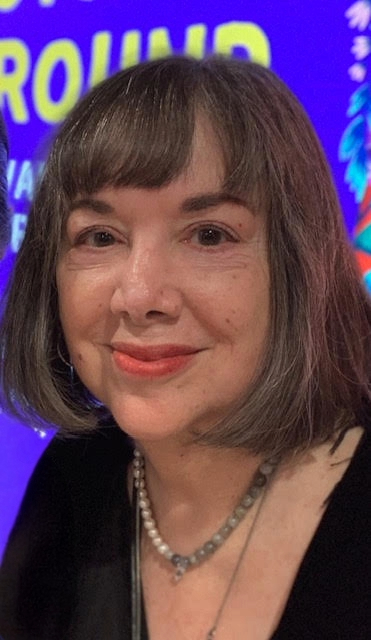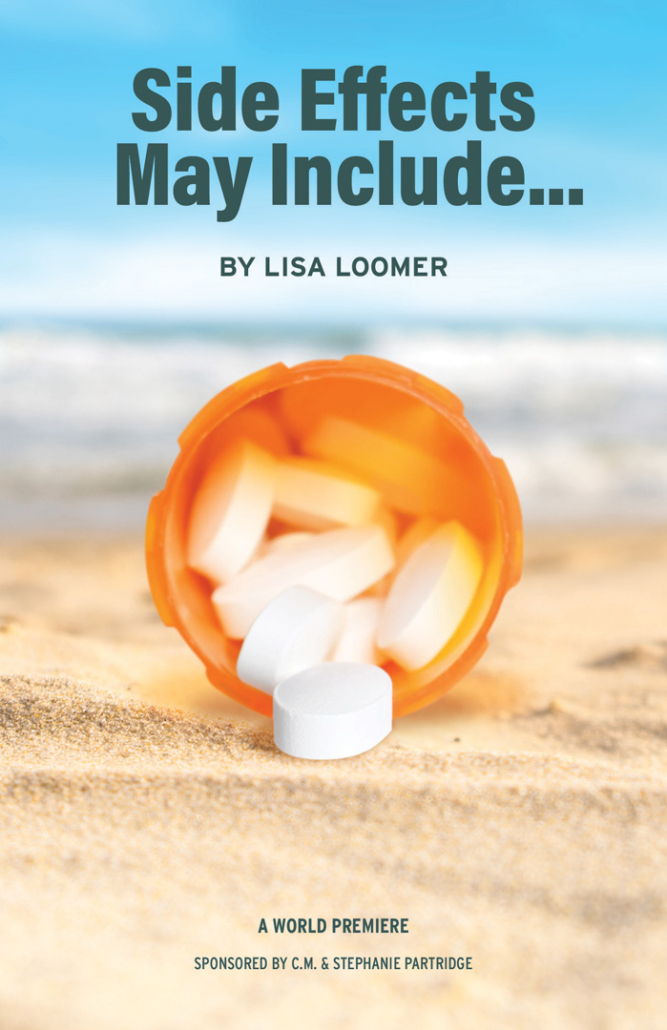Meet Lisa Loomer
Lisa Loomer is thrilled to be back at CATF. She is the book writer of Real Women Have Curves, for which she received the 2024 Kleban Prize for most promising musical theatre librettist. The musical opened on Broadway in April 2025. As a playwright, her work has been produced at major theaters across the country and taught in both Women’s Studies and Latine Studies classes. Her play Roe, about Roe v. Wade debuted at the Oregon Shakespeare Festival and went on to such theaters as Arena Stage, the Goodman, and Berkeley Rep. Other plays include The Waiting Room (Williamstown, Vineyard), Living Out (Mark Taper, Second Stage), Distracted (Mark Taper, Roundabout), ¡Bocón! (Mark Taper Forum), and Café Vida (LATC). Ms. Loomer is an alumna of New Dramatists and the recipient of the American Theatre Critics Award (twice), PEN Award, Jane Chambers award (twice), Kennedy Center New Plays Award, Susan Smith Blackburn, and an Imagen Award for positive portrayals of Latine people in all media. Screen credits: Girl Interrupted.
Interview with the Playwright
Conducted and edited by Sharon J. Anderson
CATF: You have said, “Whenever I am approached about a new project, I ask myself, “Why this story, why now?” Why this show? Why now?
LL: I was curious and concerned about the proliferation of psych meds, especially during COVID. I was concerned about the issue of informed consent as increasingly people were being prescribed medication online. I was seeing more TV commercials for more psych meds where those “side effects” fly by… All this, with the experience of my son, led me to an interesting question: “Are we medicating life itself?”
Why transform your article — “Boy Interrupted: A Story of Akathisia” Mad in America — Science, Psychiatry and Social Justice 6/13/21 – into a play? What does a play do that an article doesn’t?
I have a really strong answer to this right now. The musical – “Real Women Have Curves” — that I wrote the book for is now in production. At this moment in time, I believe in the power of theater more than I ever have in my life because of my experience with this show. This is a show about immigrants and it’s taking time in a place where immigrants are being vilified. People are telling me that they went into the show angry and filled with prejudices against immigrants and came out with their minds blown and their hearts cracked open; that they will never look at this issue the same way again. That’s the power of theater.
There’s magic about sitting together in the dark with some important questions, sitting next to a stranger. You’re laughing at one thing. They’re laughing at another. Sometimes you are crying at the same moment, sometimes not. It’s very primal. I’ve worked in film and TV but I still find theater to be the most powerful
medium.
The CATF brochure describes your play as “written with humor and fury.” After reading your play, this proverb, with one word change came to mind: “Hell hath no fury like a mother scorned.” How has fury helped you?
Fury may be the initial impetus for a lot of my plays. But also curiosity. Something in society is pissing me off or puzzling me and I want to understand it. So my way is to write a play about. Fury is what gets you up in the morning and keeps you writing despite the fact that you are probably not going to make any money from it and you are also taking time from other things in your life to do it, but you just have to address it in whatever way you can. This is my own small way. I’m doing this play for my son. I’m doing this because my son asked me to do it.
Your play also uses humor. In his essay about comedy and tragedy, Samuel Taylor Coleridge wrote that comedy was “more useful and relevant to the human condition than tragedy.”
Comedy is what opens your heart. Comedy is what allows you to get serious at other points in the play. Comedy is what brings us together; it’s what makes us comfortable; it’s what makes us assured that we are not being told what to think, we are not being prodded, we are not being attacked. We are invited into our common human experience, which is laughter.
Why do you think that the use of antipsychotics has increased so much over the past two decade?
The play asks that question: why has it increased so much? Access has increased. During COVID we saw the first instances of being able to have medication prescribed online through a virtual interview through some sort of therapist. Ease has increased. Our times are getting more and more challenging and acute. The family is falling apart; support systems are falling apart. There are many reasons, but that’s just my personal opinion.
The mother in your play says, “ . . . look at it from the point of view of—evolutionary biology. What if some people are just not wired to live productive capitalist society sorta lives? Should we medicate the shit out of ‘em to get them “back on course” anyway?”
My son likens akathisia to climate change on the level of the human organism. Our bodies are not ready. The mother in the play asks, “Are we doing to our bodies what we’re doing to the planet?”
An article in May 15, 2018 article in Psychiatry, Psychology and Law argues that most mental disorders have ‘fuzzy boundaries’ and fade gradually into normality, for example, “When does sadness turn into depression, particularly when life stressors (grief, job loss, breakups of intimate relations) that would upset almost anyone are present? When should anxiety and worry justify a diagnosis if there is something real to worry about?”
That exact question is included in the play during an imaginary conversation between the mother and the initial psychiatrist who prescribed for her son: when are we medicating life itself? What is “normal”? Who determines that dividing line? Usually it’s the people working on the current DSM who determine that fine line between normal problems and problems requiring medication.
“But isn’t it sometimes normal to suffer?” asks the mother in your play.
Terrible things happen in all our lives. I suppose I’m asking how we develop the resilience to grow from them.
The mother also wonders, “. . . is there ever a time when suicide is a sane response to unbearable chronic pain?”
I would leave that question up to the person who is actually experiencing suffering. One thing that I have learned through my son – and I think of myself as an empath for better or for worse; lately, for worse – is that there is only so much that we can really understand about another person’s suffering. I am not in a position to judge it or judge how they handle it. It’s like looking at poverty. You can’t judge how someone is dealing with it. You’re better off sticking with the awe that you feel that they are dealing with it. I’m more comfortable with awe than judgement.
Why do we ignore the side effects affixed to our prescription bottles?
Because they are so scary. I just take thyroid medication and it scares me to read the side effects. I should always read everything.
Are you completely anti-drug?
I am completely pro-informed consent. I am anti-anything that obstructs informed consent.
The ending to your play has a recurring anthem of sorts: “I am not this injury.” “I will not let this injury define my life.”
Those are my son’s words. They are passionate and fierce and very wise. We are not defined by our injuries. We have something in us that is greater and truer than our circumstances or what has happened to us.
Throughout your play, the mother often addresses the audience directly – why?
I’m an instinctive writer and that’s how it came to me . . . that this character is addressing the audience. It’s intimate, it’s personal, it’s hopefully both comfortable and uncomfortable.
What does the mother need from the audience?
That’s a good question. I’m going into a real rehearsal with it, the actress will ask that. I think that our best hope is connection and community. This is a community problem: Are we medicating life itself? It’s a community question so it bears asking in a community setting.
In your article “Boy Interrupted” you write: “I can’t talk about a ‘happy ending.’ Not yet. We hold fast to the research that says that in time the brain does heal. If I can’t slay the goddess Akathisia, I’ll just have to outwait her.”
I think what the mother does in the play is an ending. She is a person who has tried to fix things, to kiss and make it better, to read everything, to go to every single kind of doctor, explore this akathisia from the spiritual point of view, from the dietary point of view – whatever point of view, she’s going to fix it. In the end, she cannot fix it. We can’t necessarily fix the course of another person’s journey, but we can accompany them.
You have said that theater affords you a forum in which to address topical issues in a way that TV won’t allow. “It’s creative freedom . . . You’re only limited by your imagination.”
That is what I love about theater, especially non-commercial theater. It’s very exciting for me to go literally from Broadway to a theater in West Virginia that does challenging new plays.
Is there a question you wish I would have asked?
I want people to know that the only thing I am advocating in this play is informed consent. I certainly am not questioning anybody’s choices.
I am asking each playwright to comment on this line – a recurring theme — from Samuel Beckett’s novel, The Unnamable: “Words are all we have.”
I wrote a book for a musical, so no, we also have music! There are many ways to get to the
heart of things. My thing is words.
A Letter from Lisa Loomer for CATF’s Weekend of Giving
I come to CATF straight from Broadway. In the past two months I’ve had radically different experiences as a playwright…and as a theater lover. I’m grateful for both. First, I want to thank you if you came out and saw my play. I know it’s not an easy one. Though our audiences allowed the humor in it to open their hearts. For me, to be free of commercial pressure this summer and just tell this story was an incredible gift. All five of us playwrights were given that gift…along with so many others! A true theater community. A place that actually welcomes “challenging” plays and diverse voices. Yeah, a lot of theaters say that. But CATF walks their talk. And we were well fed on every level. Everyone working on our plays, along with our amazing interns, was consistently celebrated and thanked.
I felt…at home.
I don’t know how to get ticket prices down on Broadway so the people who most need to see a play get to see it. But I’m writing to ask you to keep making it possible for people to see new American work at CATF because you’ve been doing a great job of that for decades. You are keeping the lights on for new work. I don’t know that a play can change the world. But it sure helps us to look at it…together.
Best,
Lisa


